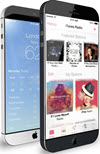Google unveils Android 4.1 aka Jelly Bean
What happened?
Google unveiled the latest version of Android at its annual I/O conference in June, alongside a host of other announcements, including its Nexus 7 tablet, statistics on Chrome browser usage, and the hefty price tag for its Goggles augmented-reality headset.Android 4.1, codenamed Jelly Bean (following 4.0's Ice Cream Sandwich), has a new rendering system called Project Butter, which should make it faster. It also has a voice-dictation tool that works even when the phone doesn't have a connection; an updated Notifications center; and many more new and upgraded features.
However, it won't include Flash, because the software's maker, Adobe, has said it will stop support for Android devices. This means the Nexus 7 and future Android smartphones won't have the popular media-playing software, and will have to rely on HTML5 instead. Jelly Bean arrives in mid-July.
Google also announced a huge increase in the number of people using Chrome, claiming it is now the world's most popular browser with 310 million users, a figure that's more than doubled in the past year. This has been disputed by Microsoft, keen to retain the top spot for Internet Explorer, but there's no doubt Chrome's success has been phenomenal, and Google is looking to extend its reach by releasing a version for iPhones and iPads.
For many I/O attendees, the highlight of the event was a demonstration of Goggles, in a sky-diving stunt (watch the video). The futuristic specs display information on the lens, so the wearer doesn't need to look at a smartphone for mapping, messages and other information. Such convenience -and questionable fashion sense- will cost you $1,500 (about £960), although Goggles won't be widely available until 2014.
How will it affect you?
Only 10 per cent of Android users have moved onto Ice Cream Sandwich, so it's unlikely you'll be seeing any of Jelly Bean's new features soon, unless you're planning to buy a phone in the next few weeks. If you do, get ready for life without Adobe Flash. The bulk of the content for devices like Nexus 7 will come via Google Play Store, but buying a Flash-free smartphone or tablet could mean you're unable to access some of it. That said, this hasn't bothered Apple's millions of fans.What do we think?
Bravo to Google for an exciting set of announcements. Between Android 4.1, the Nexus 7 tablet and the thrilling - if silly-looking- Goggle headsets; Google has certainly kept things interesting. The combined impact of its fun futuristic toys, sensible Android updates and low-cost hardware makes Google seem like a confident company that knows where it's heading.While Google is frequently criticized for launching half-baked products that fail to draw users (anyone remember Buzz?), it's impossible to ignore the momentum that Android and Chrome have built up. Hundreds of millions of users is a sign something's going right, and at this point, we're happy to go along for the ride - especially if the Goggles end up looking less daft.





 TechQuark is a mobile-friendly website. Simply bookmark
TechQuark is a mobile-friendly website. Simply bookmark 